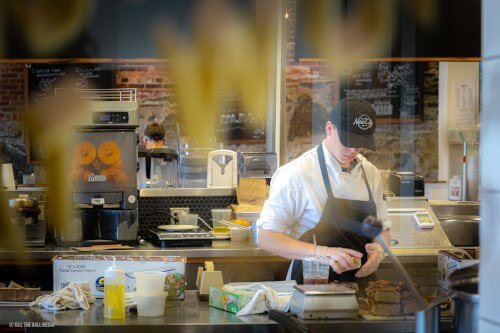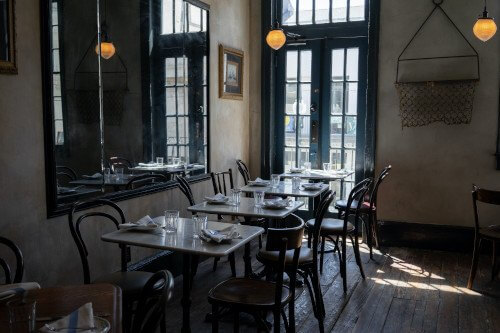
How to improve restaurant management
To run a restaurant in our days, you need to know about marketing, accounting, economics and finance, people management, kitchen management, personality psychology, and other disciplines. It is impossible to describe all the details of this profession in one article, so we will give only a few rules that you should know and apply; otherwise, you could potentially lose your entire business.
When the entire business's fate that you have created or are currently running is at stake, you start thinking and acting more actively. It is most appropriate to look at yourself and improve your restaurant management style because careless and uneducated managers ruin already established projects or will not be able to promote potentially worthy ones.
Provide comfort to your customers
 The guest should feel good at your restaurant, whether sitting or standing. He should not experience any cold, heat, or light directly in his eyes, or even darkness that would make it impossible to see your dishes. Stuffiness, smoke, uncomfortable furniture do not contribute to the comfort of your guests.
The guest should feel good at your restaurant, whether sitting or standing. He should not experience any cold, heat, or light directly in his eyes, or even darkness that would make it impossible to see your dishes. Stuffiness, smoke, uncomfortable furniture do not contribute to the comfort of your guests.
If, when visiting an establishment, you find sitting on an uncomfortable chair, then the thought comes: "Why does this restaurateur want me to suffer during a visit to his establishment?" The answer suggests itself: he does not understand what hospitality is, or he adheres to the belief that it is possible to increase the seats’ turnover, and therefore the revenue and profit of the institution. In any case, with such approaches, the business will not be profitable.
It is necessary to start raising your institution's level, starting with the leading manager in charge during the shift. The manager should be exceptionally attentive to provide a comforting environment in the restaurant for each guest. In this way, the manager’s approach can even slightly influence other managers and employees of your restaurant, in a positive way to work together in the same direction. Otherwise, everything will be mediocre, and from the guest's point of view, any failure is a complete failure.
Be special
Often, when restaurateurs are asked about the main idea, a highlight, or a so-called competitive advantage, restaurateurs answer the same thing: "Delicious food and excellent service." And only then, when you specify: "It is the answer for every restaurateur because this is the basis for this type of business! And how are you different from others?"- it turns out that the managers have nothing to say. And this is sad because having your special moments, features, "tricks" are essential not only for a person, but being specific and unique is just also equally crucial for a restaurant.
The restaurateurs do not understand that the emotional atmosphere and its manifestations should be expressed in concrete actions. For this reason, guests do not form an attachment to the place and are not ready to perceive it as "theirs." And managers only "play" with discounts and price reductions, trying to attract customers and entirely not realizing that it's not a matter of price; they are only losing money and guests.
Conclusion: take more care to find your zest! In such restaurants with no specific mission or vision, then a restaurant’s necessary tasks cannot be fulfilled (this is just some delicious food with excellent service). Of course, if there is no zest, then an emotional atmosphere is also not formed.
Become a true leader for your employees
 It is impossible for a person alone, even the most ingenious one, to work through the restaurant shift alone. We need a well-coordinated and motivated team.
It is impossible for a person alone, even the most ingenious one, to work through the restaurant shift alone. We need a well-coordinated and motivated team.
Our employees often work at high speeds, in difficult, physically tricky environments. That is why managers, chefs, and shift leaders need to learn and become those who can not dryly hand out tasks but inspire staff to perform small feats every day.
If you are upset but have to go out to see guests because you are a waiter, you should not show your negative emotions. If you are not happy, but you are angry, you would have to overcome the negative feelings before starting your work. But often, employees are not able to cope with such a state by themselves; therefore, it is crucial for a leader to be able to inspire, to support, to invigorate, and to be able to focus on the results. If this is not the case, then it is evident that employees cannot endure in such a complex environment such as a restaurant.
This is often the cause of employee churn and theft. Do not be surprised, but it depends on the person who runs the restaurant. If the person in charge can inspire you with joy and inspiration, the employee will hold on to the job.
Any waiters must have at least once experienced a fall in the restaurant hall or have dropped a tray. Through failures, we become stronger and more professional. And at such moments, there should be a leader nearby who will support and help with the right advice and not criticize or insult, which will lower self-esteem and instill fear of being wrong.
Conclusion: be a leader and inspirer for the employees. Managers should also be able to inspire the staff members, instill faith in themselves, grow their strengths, and help them overcome their fear of making mistakes.
Know the professional details of all areas of the restaurant
 Take into account the words of Arie de Gues, who believed: "The ability to learn faster than your competitors may be the only sustainable competitive advantage." You don't have to be locked into a rigid box that limits your creativity. You need to strive to be a bright restaurant manager, pros, and creator!
Take into account the words of Arie de Gues, who believed: "The ability to learn faster than your competitors may be the only sustainable competitive advantage." You don't have to be locked into a rigid box that limits your creativity. You need to strive to be a bright restaurant manager, pros, and creator!
Where else can you find so much creativity if not in management work? We often reinvent the wheel and don't understand how to solve what has long been the norm for good managers and market leaders.
Know how to be critical of the level of your competencies. Always find directions for development, and learn. Know how to choose the right teachers, books, and any training program. Remember, teachers come when the student is ready!
Look for training courses - get an in-depth, systemic education. It's good when restaurant managers become masters of business administration (MBA).
Conclusion: learn, be active, and you will succeed! Learn not only to create and manage your business but also have something to be able to convey to your employees for any development. After all, a manager is also a mentor. You should also study to check subordinates and control the business in-depth and in detail if necessary. It's time to grow out of the status of a leader who has nothing to tell his colleagues and who can be easily misled.
Deal with restaurant economics
Economic literacy, understanding of accounting rules - both production and financials - are extremely important for enterprise managers.
Some managers do not understand the accounting system, do not see the situation as a whole, and are not ready to lay the foundations of their enterprise's accounting policies. Technologists and accountants run the show in these restaurants.
There are also a lot of errors:
- Grouped names in the name of the goods;
- Ingredients not included in the recipe;
- Unauthorized and unconfirmed transfers between internal accountings in warehouses.
Also, often, the cases are that there are economic illiteracies. In such cases, managers cannot identify the problematic areas and do not understand how they have arisen, and therefore do not know how to solve them. Consequently, before analyzing the data, it is necessary to identify the critical parameters of the goal:
- What tasks you want to solve in the restaurant;
- What problems you are working on now;
- What questions you want to find answers to;
- What issues you are concerned about.
Conclusion: set a goal when working with numbers. There should be no analysis for the sake of research. Numbers should help solve a problem and not be an end in itself or just statistics of your activities.